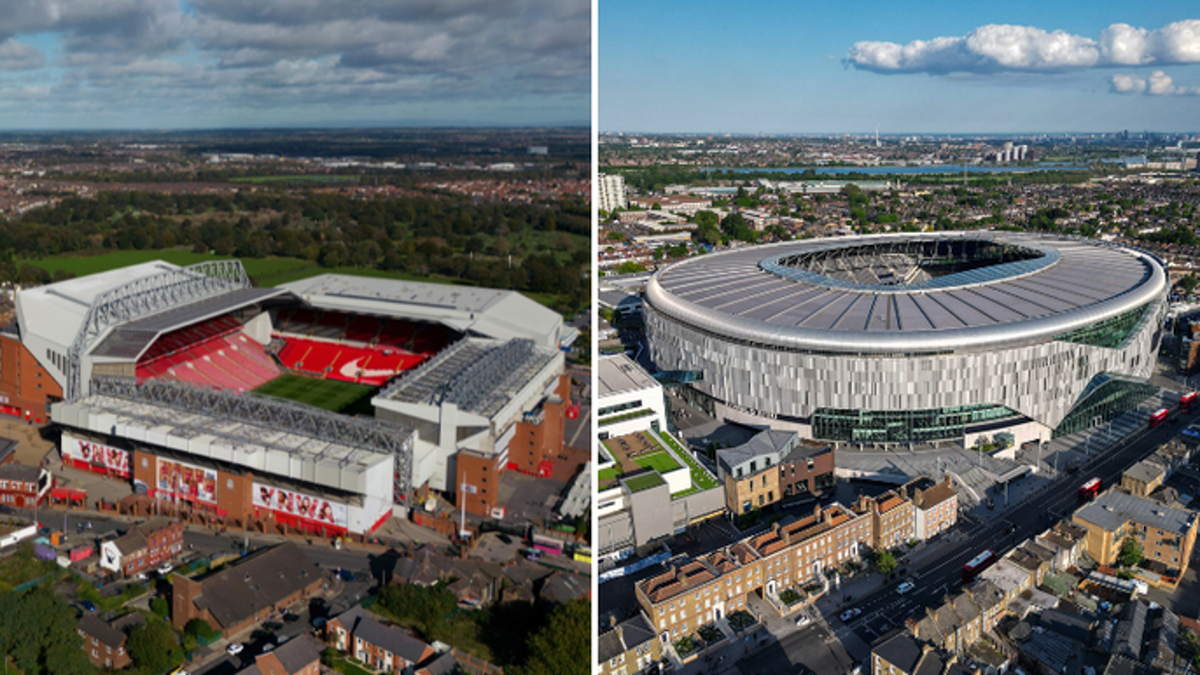Infra
Labour promises 10-year infrastructure strategy with significant private investment | New Civil Engineer

The Labour Party has pledged to develop a 10-year infrastructure strategy to “guide investment plans and give the private sector certainty about the project pipeline”.
The party’s General Election manifesto Change: Labour Party Manifesto 2024 has a section dedicated to “Economic infrastructure” where it says that its infrastructure strategy will be aligned with its industrial strategy and its regional development priorities, which includes “improving rail connectivity across the north of England”.
It will “work closely with business to map and address the delivery challenges we face”.
Key to this will be the previously-revealed National Infrastructure and Service Transformation Authority (Nista). Nista would combine the Infrastructure and Projects Authority and the National Infrastructure Commission “to set strategic infrastructure priorities and oversee the design, scope and delivery of projects”.
Planning
Labour says that the “current planning regime acts as a major brake on economic growth”. It says it will “make the changes we need to forge ahead with new roads, railways, reservoirs and other nationally significant infrastructure”.
This will include publishing new national policy statements, making major projects “faster and cheaper by slashing red tape” and building support for developments by ensuring communities directly benefit.
Under a Labour government, the national planning policy would be updated “to ensure the planning system meets the needs of a modern economy, making it easier to build laboratories, digital infrastructure and gigafactories”.
Labour will further reform the compulsory purchase compensation rules to “improve land assembly, speed up site delivery,and deliver housing, infrastructure, amenity and transport benefits in the public interest”. This will ensure that “landowners are awarded fair compensation rather than inflated prices based on the prospect of planning permission”.
Transport
“Rebuilding Britain means modernising our transport infrastructure,” the manifesto states. It then goes on to pledge to maintain and renew the road network to ensure it remains safe and tackles congestion.
It will pay to fix an additional 1M potholes in England each year, funded by deferring the £320M A27 Arundel Bypass scheme, which it says is “poor value for money”.
Labour will support the transition to electric vehicles by accelerating the roll-out of electric charge points and restoring the phase-out date for sale of new cars with internal combustion engines to 2030.
It says it will “overhaul” Britain’s railways by bringing them into public ownership. “We will do this as contracts with existing operators expire or are broken through a failure to deliver, without costing taxpayers a penny in compensation,” it states.
It would continue down the path set by the current government of establishing a new body Great British Railways (GBR) that “will deliver a unified system that focuses on reliable, affordable, high-quality and efficient services; along with ensuring safety and accessibility”.
Similar to the Conservatives’ plan, GBR under Labour would “be responsible for investment, day-to-day operational delivery and innovations and improvements for passengers, working with publicly-owned rail operators in Wales and Scotland”.
Labour will empower regional mayors to have a role in designing the services in their areas. A Labour government would give mayors “the power to create unified and integrated transport systems”.
It will create a long-term strategy for transport to ensure that the infrastructure can be delivered efficiently and on time.
There will be a “duty” to promote and grow the use of rail freight.
Labour would also establish a “tough” new passenger watchdog to drive up standards.
It would also “secure the UK aviation industry’s long-term future, including through promoting sustainable aviation fuels and encouraging airspace modernisation”.
Improving resilience
The manifesto does not give much detail on how it will improve the UK’s resilience against climate change, but acknowledges that preparation and adaptation is necessary.
“Without action, flooding and coastal erosion will pose greater risks to lives, livelihoods and people’s wellbeing,” it states. “Labour will improve resilience and preparation across central government, local authorities, local communities and emergency services. This includes formally working with all stakeholders in the Fire and Rescue services to inform policy and establish national standards.”
Industrial strategy
Labour would introduce a new industrial strategy that is “mission-driven and focused on the future”.
“Labour will take a sectoral approach and be clear-eyed about where the UK enjoys advantages over other countries,” it states. “Our approach will back what makes Britain great: our excellent research institutions, professional services, advanced manufacturing and creative industries.”
It will ensure a “pro-business environment” with a competition and regulatory framework that supports innovation, investment and high-quality jobs.
Procurement and trade policy will also be aligned with the priorities of the industrial strategy.
National Wealth Fund
Labour will boost public investment “where it supports and de-risks additional private investment”.
It will support this with a National Wealth Fund worth £7.3bn over the first Parliament. This fund will have a remit to support the party’s growth and clean energy missions and have a target of attracting three pounds of private investment for every one pound of public investment.
Specific allocations announced are:
- £1.8bn to upgrade ports and build supply chains across the UK
- £1.5bn to new gigafactories “so our automotive industry leads the world”
- £2.5bn to rebuild the steel industry
- £1bn to accelerate the deployment of carbon capture
- £500M to support the manufacturing of green hydrogen
‘Clean energy superpower’
Labour has set out the missions of making Britain “energy independent once again” and delivering clean energy by 2030.
The manifesto states: “We have tremendous untapped advantages: our long coastline, high winds, shallow waters, universities and skilled offshore workforce combined with our extensive technological and engineering capabilities.
“With a serious industrial strategy and a genuine partnership between the public and private sectors, we can make Britain a clean energy superpower.”
To deliver clean power by 2030 a Labour government would work with the private sector to double onshore wind, triple solar power and quadruple offshore wind. Additionally, it will invest in carbon capture and storage, hydrogen and marine energy while ensuring that there is capacity for long-term energy storage.
It will introduce a new Energy Independence Act to establish the framework for its energy and climate policies.
It sees the national grid as the “single biggest obstacle to the deployment of cheap, clean power generation and the electrification of industry”. It says that due to connection dates not being offered until the late 2030s, important business and infrastructure being stalled or lost overseas. The party would work with industry to upgrade national transmission infrastructure.
Relating to nuclear it commits to extending existing plants, delivering Hinkley Point C and Sizewell C and introducing small modular reactors (SMRs).
It will maintain a strategic reserve of gas power stations “to guarantee security of supply” while ensuring a “phased and responsible transition in the North Sea”.
It will not revoke existing oil and gas licences but it will “partner with business and workers to manage our existing fields for the entirety of their lifespan”. It will not issue new licences to explore new fields.
Labour would close loopholes in the windfall tax on oil and gas to support the investment in its energy plan.
As previously revealed, a Labour government would “switch on” Great British Energy (GBE), a new publicly owned energy company to “deliver power back to the British people”.
GBE “will partner with industry and trade unions to deliver clean power by co-investing in leading technologies, will help support capital-intensive projects and will deploy local energy production to benefit communities across the country”.
To support this, Labour will capitalise GBE with £8.3bn over the next parliament.
It will introduce a Local Power Plan that will see GBE partner with energy companies, local authorities and co-operatives to install “thousands of clean power projects, through a combination of onshore wind, solar and hydropower projects”.
It will invite communities to come forward with proposed projects and work with local leaders and devolved government to ensure communities benefit from these plans.
Accelerating net zero
A Labour government would also “accelerate net zero” by introducing a carbon border adjustment mechanism. This “will protect British industries as we decarbonise, prevent countries from dumping lower-quality goods into British markets and support the UK to meet our climate objectives”.
Additionally, it will ensure that the institutional framework for policy making reflects net zero and carbon budget commitments. This means the Bank of England will give due consideration to climate change in its mandates – something the current government had blocked, according to Labour.
Labour will harness the UK’s financial services industry to mobilise “trillions of pounds in private capital to address the greatest long-term challenge of our age” and make the UK “the green finance capital of the world”.
This will see UK-regulated financial institutions and FTSE 100 companies mandated to develop and implement credible transition plans that align with the 1.5°C goal of the Paris Agreement.
Reaction – ‘bold’ commitments welcomed
The Civil Engineering Contractors Association (Ceca) has welcomed Labour’s “bold commitment to infrastructure”.
Ceca chief executive Alasdair Reisner said: “The Labour Party’s commitment to delivering a business-friendly, high-growth economy through infrastructure delivery will be welcomed by the UK’s civils contractors.
“It is gratifying that the Labour Party has recognised that the best means of delivering economic growth is through infrastructure delivery, planning reform and unlocking shovel-ready schemes in all parts of the UK.
“In particular, should Labour form a majority in the next Parliament, we look forward to working closely with Sir Keir’s team on the manifesto commitment to deliver ‘a 10-year infrastructure strategy, aligned with our industrial strategy and regional development priorities’.
“Ceca stands ready to work with our members and which whichever party or parties form the next UK Government, to ensure infrastructure for growth is at the heart of the next administration’s approach to the economy.
“The Labour Party’s commitment to placing infrastructure at the heart of government decision-making, delivering a long-term transport strategy and rolling out much-needed planning reforms all reflect CECA’s policy recommendations to an incoming government closely.
“The next UK Government must hit the ground running and we look forward to working with our members and the next government to identify shovel-ready schemes that can be moved towards delivery without delay and which will create jobs, boost economic growth and improve the quality of life for communities up and down the country.”
Like what you’ve read? To receive New Civil Engineer’s daily and weekly newsletters click here.










